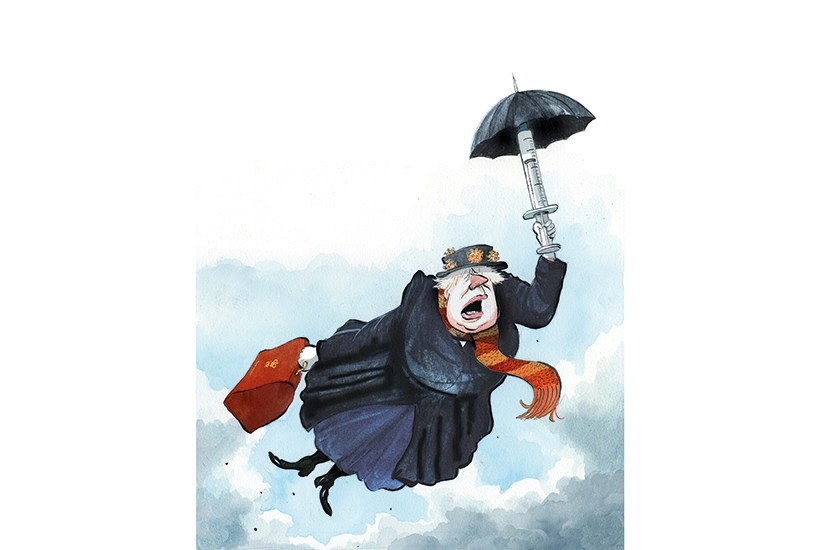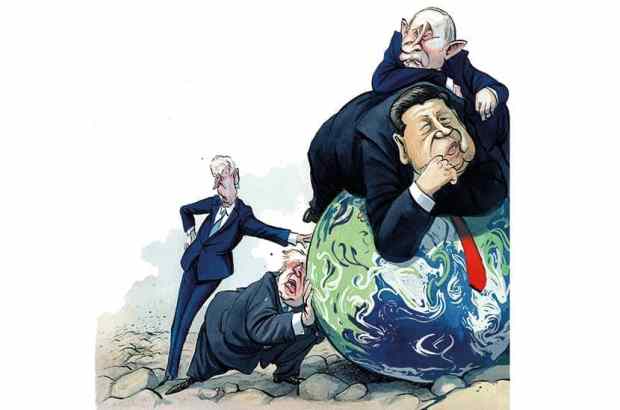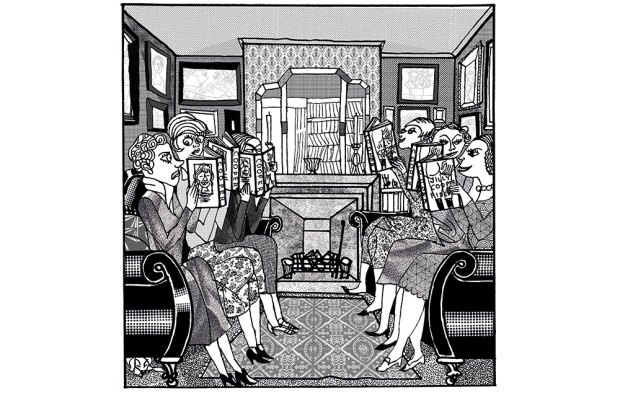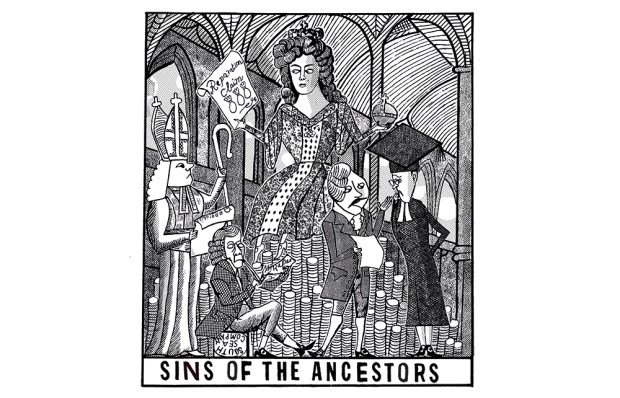‘Freedom day’ is coming, but how free will we actually be when it arrives? Boris Johnson is to abolish all coronavirus restrictions on 19 July. But in the small print, we find a strange caveat. The government will be ‘encouraging’ businesses to demand proof of vaccination from customers if there’s a ‘higher risk’ of the virus spreading on their premises. If they do not do so, then the government reserves the power to force them to. It’s a voluntary system — until it’s not.
In a rather Orwellian turn, ‘freedom day’ means freedom for some, but not others. The unvaccinated might find their freedoms curtailed in ways that would have seemed astonishing not so long ago. Meanwhile, the controversial ‘no jab, no job’ policy, through which the unvaccinated can be fired or not hired, has been formalised and expanded beyond those who work in healthcare.
Yet just two weeks ago, vaccine passports were dismissed in Whitehall as an idea whose time had already passed. Israel tried its ‘green passes’ and then abandoned them as unnecessary. In America, Joe Biden ruled out vaccine passports at a federal level, and Florida and Texas banned them.
But in Britain, with no open debate or even a vote in parliament, the Prime Minister is hoping to sneak through a fundamental change in the nature of the relationship between individual and the state. Freedom — to go to cinemas, watch football and so on — could soon not be guaranteed to all, but contingent on criteria decided by the government and enforced by private companies. Johnson looks set to bring in an ID card system that is even more intrusive than the Blairite scheme he once so fervently opposed. And this fits a trend. From gambling laws to the huge salt and sugar taxes now being proposed, the current government is doing a fairly good impression of creating the nanny state that Johnson once held up to ridicule. Big Boris is watching you — while pretending not to.
It is wrong to claim, as so many do, that the PM has never held consistent political opinions. Hundreds of columns and speeches come together to form a fairly coherent worldview of a liberal who thinks government ought to be less censorious and trust people more. The Spectator under his editorship championed this stance. He built a career poking fun at health and safety rules, even the notion of seatbelts in the back seats of cars. Like his Euroscepticism, the jokes had a serious point: countries are at their strongest, he argued, when people are trusted to exercise their own judgment. When he stood for party leader, he explicitly sold himself as a ‘liberal Conservative’.
It was quite credible, given his CV. Take his 2004 battle against Tony Blair’s identity cards: a crusade that cut straight to the heart of his politics. ‘I loathe the idea on principle,’ he once explained. ‘I never want to be commanded, by any emanation of the British state, to produce evidence of my identity.’ When Blair’s scheme was voted through, Johnson pledged ‘to keep up the fight’ and ‘ensure that when we have a Tory government, we scrap this expensive, illiberal, intrusive and almost certainly useless measure’.
Now, as a Prime Minister with a 83-strong majority, he is forcing through an even more expansive, illiberal and intrusive version of the scheme he pledged to scrap. We’re told that he’s curtailing liberty with a heavy heart, but no one has explained why he is pressing ahead with it. Blair, at least, had an open debate in parliament so MPs such as Johnson could make their case, ask questions and vote against the plan. Johnson’s government prefers to avoid debate and instead have the private sector do its dirty work. Voluntary systems are being established, but with the clear threat of government making business impossible for companies that don’t oblige.
The pandemic has shaken faith in liberal democracy: opinion polls show huge support for curfews and quarantines. Johnson himself has remarked in private that he has been amazed at how easy it is to take freedoms away — and how hard it is to give them back. It’s quite possible he has concluded his liberalism was for an era that perished in the pandemic. Some of the most liberty-loving Tories have looked with envy towards Asian countries whose surveillance technology seemed to do a better job of stopping the spread of Covid. The future may well be one in which the government knows your temperature wherever you go, and vaccine passports may be welcomed as an alternative to blanket lockdowns.
There is a case for all of this. But no such case has been made — at least not in the open. We instead see a worrying pattern: ministers promising not to implement vaccine passports, then breaking their word, then presenting them as a reserve option, then as a fait accompli. ‘I certainly am not planning to issue any vaccine passports and I don’t know anyone else in government who would,’ said Michael Gove in December. The government has ‘absolutely no plans for vaccine passporting’, promised vaccines minister Nadhim Zahawi in February: the very idea, he added, was ‘absolutely wrong’. Downing Street said it was ‘discriminatory’.
The lack of debate matters because important questions are not being asked. For example, what if — as the latest studies suggest — the double-vaccinated still have a 21 per cent chance of catching and transmitting the virus? The vaccines are effective at preventing serious illness, but how far can we say that a fully vaccinated theatre is safe? And without such assurance, what’s the point of any nightclub or sports arena screening its customers in this way?
Vaccine passports may have a marginal impact on slowing the spread of the virus (especially in a Britain where 90 per cent of adults have antibodies), but what if their real purpose is to harass the unvaccinated on a daily basis, thereby encouraging vaccine uptake? Then comes the more important question: who would be excluded from society by a vaccine passport? A Tory party that took so much flak for the Windrush scandal ought to be careful about pushing any scheme that’s likely to hit ethnic minorities hardest, as vaccine passports would do. All over-fifties have been offered the jab. Among them, just 6 per cent of whites are unvaccinated compared with 31 per cent of blacks — an ethnicity gap that refuses to narrow.
As the vaccine programme works its way down the age range, ministers are also worried that the young are not co-operating. Non-white groups are proving particularly hard to convince. In France, Emmanuel Macron is thinking about making vaccines compulsory. Vaccine passports offer a softer tool of coercion: people are free, in theory, not to have the jab, but their lives can be made much more difficult by the government. It could become harder to get a job, harder to travel, harder to go anywhere that isn’t home.
The Prime Minister has been honest about how the pandemic has shaken his liberalism. He thinks he almost died from Covid because he was overweight and is far more willing to allow the government to intervene in our diet choices. Hence a series of new measures he’d once happily have denounced as ‘nanny statism’: a ban on fast-food advertising, for example, and forcing restaurants to display calorie counts on menus. Quite a change from the man who once promised the Tory party conference that if in charge, he ‘would get rid of Jamie Oliver and tell people to eat what they like’.
During the hustings for the Tory leadership, he promised there would be no ‘milkshake tax’ on his watch. There hasn’t been — yet. Instead, he has banned three-for-two offers on food deemed to be unhealthy. Free refills on sugary drinks are also to be banned. A Boris-ordered food review from Henry Dimbleby, out this week, suggests that this will be only the start: sweeping sugar and salt taxes will be next. Meat taxes, he says, would come afterwards – if they were not so politically troublesome. Jamie Oliver is offering is full-throated support.
And yes, the Dimbleby ‘food reformulation levy’ would be expensive – but so is pretty much everything that Johnson now proposes. His oft-declared liberal preference for small government and low taxes seems to have given way to far higher spending – and government setting its remit beyond anything Gordon Brown envisaged. ‘Anyone judging this government by its policies alone would think it’s a Ukip-Corbyn coalition,’ says one senior Tory MP. ‘Yes, we left the EU. But what then? We’re not becoming a smaller-state, lower-tax country — we’re ending up like a Corbynite theme park, with the state presenting itself as the answer to every problem.’
It’s not hard to find other Tory MPs who complain that Johnson’s government has lost its bearings. ‘It’s like we forget we’re Conservatives,’ says one minister, ‘acting as though several billion pounds is just a drop in the ocean.’ A number of these MPs have taken their problems to the Prime Minister, who tells them not to worry: he is instinctively a liberal, small-state, low-tax Tory. But he feels he is only in power due to expensive promises made to ‘red wall’ constituencies. He doesn’t want to call an election until he believes these are honoured. ‘The depressing thing is how he defines “promises”,’ says the subject of one of his charm offensives. ‘Always high spending, which will mean higher taxes.’ His answer to this, of course, is that his manifesto has ruled out high taxes. Balancing the books is a problem for another day.
The rebellion of Tory voters in last month’s Chesham and Amersham by-election was fuelled in part by a feeling in the south that they’ll be the ones who end up paying for all of this. Similar questions surround Johnson’s plans to reach ‘net zero’ by 2050 — a pledge that will cost trillions but which he says will not hit consumers in the wallet. How can it not? Will the pledges not to introduce meat or carbon taxes go the same way as the promises not to introduce identity cards? His allies say he’s always the one inside the government making the case for liberal measures. One can only assume that he somehow keeps losing the argument.
It may be that vaccine passports in Britain will go the way of Israel’s green passes and become redundant almost as quickly as they come in. Or this could be the start of a biosecurity state: an all-seeing system that future governments will decide to use in ways that go far beyond pandemics. These are huge issues that will profoundly shape our society. But a government fearful of debate is trying to sneak vast changes through, using (and possibly extending) its emergency powers, and asking us to celebrate ‘freedom day’ while finding new ways of eroding our freedom.
Boris Johnson would have once mercilessly lampooned all of this. Now he says very little, acting almost as if someone else is in charge. But it is his government, his cabinet, his agenda. If he has had a big change of heart, with so much at stake, the least he can do is tell us.
Got something to add? Join the discussion and comment below.
Get 10 issues for just $10
Subscribe to The Spectator Australia today for the next 10 magazine issues, plus full online access, for just $10.
You might disagree with half of it, but you’ll enjoy reading all of it. Try your first month for free, then just $2 a week for the remainder of your first year.















Comments
Don't miss out
Join the conversation with other Spectator Australia readers. Subscribe to leave a comment.
SUBSCRIBEAlready a subscriber? Log in